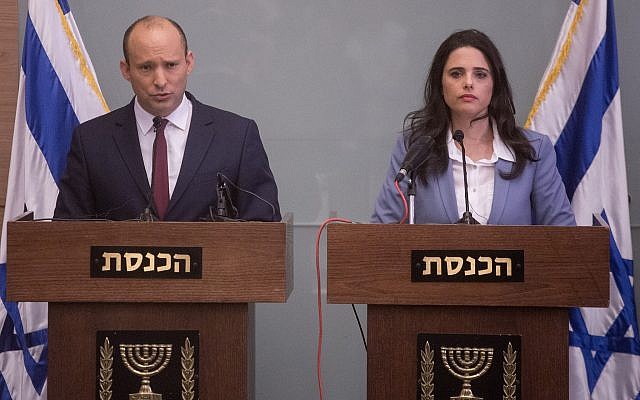Military Advocate General Corps is ‘part of the IDF’s strength,’ says Eisenkot; AG, himself a former head of MAG, says Jewish Home leader’s claim ‘untrue’

Jewish Home leader Naftali Bennett’s criticism of the army’s Military Advocate General, which he said helped prevent soldiers from carrying out their fighting duties, drew a rebuke from the IDF’s chief of staff and the attorney general on Monday.
Bennett made the comments at a press conference in the Knesset in which he reneged on his ultimatum to resign from the government if Prime Minister Benjamin Netanyahu did not appoint him defense minister.
Citing Israel’s “deep security crisis,” he said the country “has stopped winning” since the Second Lebanon War in 2006.
“I’ve seen it. I’ve seen the confusion, the chaos, the lack of determination, the lack of fighting spirit,” Bennett said. “We think that there is no answer to terror, to rockets and mortars, but there is an answer — we can get back to winning.”
During the speech, he complained that the army was too concerned with the legalities of war to fight properly, saying, “We impose on our warriors legal and conceptual hoops” they must jump through. “Our warriors are more worried about the military advocate general than about [Hamas leader] Yahya Sinwar in Gaza.”
The comment drew rare criticism of a politician from the IDF’s chief of staff, Lt. Gen. Gadi Eisenkot, who opened Monday’s meeting with the army’s general staff by backing Military Advocate General Maj. Gen. Sharon Afek.

“The MAG [corps] is part of the IDF’s strength. It stands shoulder to shoulder with the army’s commanders and warriors in carrying out their operational goals and winning on the battlefield,” Eisenkot said in comments released by his office to the press.
“Maj. Gen. Sharon Afek has carried out his duties with professionalism and excellence, and is respected both within the IDF and outside it,” Eisenkot added.
The chief of staff demanded that the IDF be “kept out of the political debate.”
Bennett’s comments also drew criticism from Attorney General Avichai Mandelblit, a retired major general who once headed the MAG corps.
“There is no truth to that statement,” Mandelblit said of Bennett’s criticism.
The army’s commitment to abide by the laws of war, he said, was “a source of strength for the IDF, its commanders and its soldiers. The officers of the MAG corps work alongside commanders in the field with the shared goal of achieving the objectives of combat.”

He added that the MAG corps under Afek enabled the army to “defeat our enemies,” and was “an inseparable part of Israel’s national resilience.”
Following the criticism, Bennett’s office said he would not apologize for the comments.
“He does not intend to apologize for or retract his remarks,” a Jewish Home party spokesperson said. “He believes that we are making ourselves jump through excess legal hoops, and this harms both operations and fighters.”
Bennett’s criticism of the IDF came during a dramatic announcement Monday morning that he would not force new elections, enabling Netanyahu’s razor-thin majority coalition to remain intact for the time being.
Despite heaping withering criticism on the government’s defense policies, Bennett said he would back Netanyahu as Israel’s new defense minister — the prime minister is also the head of the foreign and health ministries — and would “stand by the prime minister’s side” in a bid to affect Israeli security policy from within.
As reported by The Times of Israel
